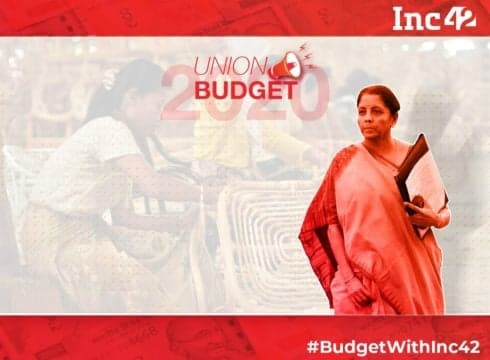Sitharaman proposed to raise the auditing threshold from INR 1 Cr in turnover to INR 5 Cr
The Budget also announced the launch of an app‐based invoice financing loans
How will the reforms and policies affect and help the MSME sector?
Inc42 Daily Brief
Stay Ahead With Daily News & Analysis on India’s Tech & Startup Economy
Union Budget 2020
Every year, we bring the rundown of the Union Budget from the lens of the startup ecosystem through a mix of pre and post budget coverage showcasing the expectations and impact on the ecosystem.
“MSMEs are vital to keep the wheels of the economy moving. They also create job, innovate and are risk-takers. Several measures for the MSMEs have been taken in the past few years. There are more steps proposed in this budget also.” – Nirmala Sitharaman, finance minister, at the Union Budget 2020
With the Union Budget 2020 announced by finance minister Nirmala Sitharaman, the government has laid a lot at the doorsteps of India’s micro, small and medium enterprises. Contributing to 50% to exports, 35% to employment and 40% to the GDP, the sector holds a lot of benefits and importance for the country. There is no denying that catalysing the growth of the sector has the potential of giving the Indian economy the necessary push to uplift it. And Sitharaman’s budget, on Saturday (February 01), looked to ensure more ease of doing business.
Click Here To Read Inc42’s Live Coverage Of Union Budget 2020.
Union Budget 2020: MSME Focus And Highlights
Aimed at facilitating the growth of the small business sector, Union Budget 2020 has proposed many measures, including the reduction of the MSME compliance burden, introducing an app-based invoicing platform and more.
Reducing Compliance Burden
“In order to reduce the compliance burden on small retailers, traders and MSME sector, I propose to raise by 5 times the auditing threshold from INR 1 Cr in turnover to INR 5 Cr. This would be applicable to only those MSMEs that transact less than 5% in cash.” – Sitharaman
Currently, small businesses that had a turnover of more than INR 1 Cr were required to get their book of accounts audited by an accountant, but Sitharaman’s move comes as a relief to reduce the burden of compliance on these businesses. Further to this, Sitharaman also promised a scheme to provide MSME entrepreneurs subordinated debt from financial service institutions.
Sitharaman further revealed that, for the goal of easing businesses in MSME sector, the government has asked RBI to extend the debt restructuring window for these businesses by a year to 31 March 2021.
Introducing Digitised Invoice Financing
“I propose to make the necessary amendments to the Factoring Regulation Act 2011. This will enable NBFCs to extend invoice financing to the MSMEs through TReDS, thereby enhancing their economic and financial sustainability.”- Sitharaman
With the RBI’s forecast of a 50% increase in mobile-based payment transactions, coupled with the fact that the number of merchants accepting digital payments has also massively increased—in a short span of two to three years the number has gone over 10 Mn—India today is well on its way into digitisation.
In such a scenario, digitised invoice financing comes as a crucial help to the MSMEs. With the introduction of technologies such as blockchain, AI and ML at the backend, MSMEs stand to benefit with the reduction in stress of compliance.
“An app‐based invoice financing loans product will be launched. This will obviate the problem of delayed payments and consequential cash flows mismatches for the MSMEs,” Sitharaman said.
Invoice financing provides businesses with an alternative where they can borrow money against the amount that’s due from customers. It helps businesses improve cash flow, reinvest in operations, growth and more, sooner compared to waiting until their customers paid them in full. Startups such as Lendingkart, Indifi, Izito are already operational in this segment.
Speaking to Inc42, Siddharth Mahanot, cofounder and COO, Indifi Technologies, said, “In a welcome move, the Central Bank has been asked to extend the Debt Restructuring window for MSMEs by a year to March 31, 2021. This move will help MSME players to tide over the current economic downturn. An app-based invoice financing loan product is another positive move, alleviating the issues faced by Indian MSME players related to delayed payments and mismatched cashflow.”
According to a report, 40% of lending to MSMEs is carried out through informal channels, making it a big opportunity for fintech startups in India. This justifies the finding of DataLabs by Inc42, which revealed that fintech startups in India raised a total of over $9.7 Bn in the period between 2014 to 2019.
As per DataLabs by Inc42, the total gross value added (GVA) of the Indian MSME is expected to grow at a compound annual growth rate of 11.12% to reach $866 Bn by FY20. The market potential of digital lending for MSME is also estimated to be between $80 Bn to $100 Bn by 2023.
“Overall, Budget 2020 is a thoughtful weaving together of specific proposals to tackle varied issues. Measures to improve access to finance for MSMEs and reduced taxation for the middle-income segment are welcome steps. Boosting physical infrastructure, expanding digital connectivity and growing use of technology in government functioning are important building blocks for the long-term growth of the Indian economy,” said Kunal Bahl, CEO and cofounder, Snapdeal.
Click Here To Read Inc42’s Live Coverage Of Union Budget 2020.
{{#name}}{{name}}{{/name}}{{^name}}-{{/name}}
{{#description}}{{description}}...{{/description}}{{^description}}-{{/description}}
Note: We at Inc42 take our ethics very seriously. More information about it can be found here.


